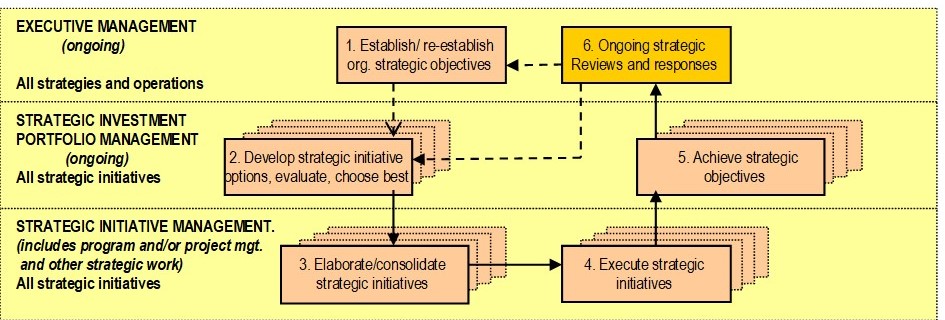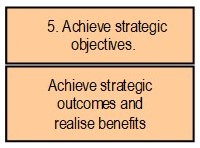to accommodate changes impacting outcomes and benefits
Revisiting organisational strategic management
(Part 2)
SERIES ARTICLE
By Alan Stretton, PhD (Hon)
Sydney, Australia
INTRODUCTION
This is the second of a series of articles in which I revisit some aspects of organisational strategic management. The first article (Stretton 2020l) developed a recursive organisational strategic management model, and discussed the crucial role of key management responsibilities at each of three levels for the effective prosecution of the stages in this model. The model is reproduced in Figure 2-1 below, but with individual strategic initiatives replaced by all strategic initiatives in the bottom sector on Strategic initiative management.

Figure 2-1: Responsibilities for managing stages of recursive organisational strategic mgt.
 In that article, it was specifically noted that, regarding the Stage 5 processes, the key strategic objectives to be achieved are outcomes and benefits – therefore strategic investment portfolio management responsibilities in this context are ongoing evaluation of performance in achieving the desired outcomes and benefits of all current strategic initiatives – and that these quite complicated topics would be discussed in more detail in this second article.
In that article, it was specifically noted that, regarding the Stage 5 processes, the key strategic objectives to be achieved are outcomes and benefits – therefore strategic investment portfolio management responsibilities in this context are ongoing evaluation of performance in achieving the desired outcomes and benefits of all current strategic initiatives – and that these quite complicated topics would be discussed in more detail in this second article.
Before going on to do so, this article first summarises some attributes of, and responsibilities for, outputs, outcomes and benefits, as previously discussed in Stretton 2020e and 2020i.
STRATEGIC INITIATIVE OUTPUTS, OUTCOMES AND BENEFITS
Some definitions/descriptors
In Stretton 2020i I distinguished between project/program-related outputs, outcomes, and benefits as follows, using definitions from the project management literature.
Output: The tangible or intangible product resulting from planned activity. (OGC 2007:247)
Some synonyms for Outputs: Capability (OGC 2007),
Results, Deliverables, Products (Driver & Seath 2015).
Outcome: The result of change, normally affecting real-world behaviour and/or circumstances. … (OGC 2007:247)
A virtual synonym for Outcomes: Uses (Driver & Seath 2015).
Benefit: The measurable improvement resulting from an outcome perceived as an advantage by one or more stakeholders. (OGC 2007:245)
Some detailed differences between outputs, outcomes and benefits
I also noted that OGC 2007 had more to say about these differences than any other source I have come across, as represented in the following figure.
More…
To read entire paper, click here
How to cite this article: Stretton, A. (2020). Augmenting a recursive strategic management model to accommodate changes impacting outcomes and benefits; Revisiting organisational strategic management (2); Series article. PM World Journal, Vol. IX, Issue XII, December. Available online at https://pmworldlibrary.net/wp-content/uploads/2020/12/pmwj100-Dec2020-Stretton-augmenting-recursive-model-revisiting-strategic-management-part-2-2.pdf
About the Author

Alan Stretton, PhD
Faculty Corps, University of Management
and Technology, Arlington, VA (USA)
Life Fellow, AIPM (Australia)
![]()
Alan Stretton is one of the pioneers of modern project management. He is currently a member of the Faculty Corps for the University of Management & Technology (UMT), USA. In 2006 he retired from a position as Adjunct Professor of Project Management in the Faculty of Design, Architecture and Building at the University of Technology, Sydney (UTS), Australia, which he joined in 1988 to develop and deliver a Master of Project Management program. Prior to joining UTS, Mr. Stretton worked in the building and construction industries in Australia, New Zealand and the USA for some 38 years, which included the project management of construction, R&D, introduction of information and control systems, internal management education programs and organizational change projects. He has degrees in Civil Engineering (BE, Tasmania) and Mathematics (MA, Oxford), and an honorary PhD in strategy, programme and project management (ESC, Lille, France). Alan was Chairman of the Standards (PMBOK) Committee of the Project Management Institute (PMI®) from late 1989 to early 1992. He held a similar position with the Australian Institute of Project Management (AIPM), and was elected a Life Fellow of AIPM in 1996. He was a member of the Core Working Group in the development of the Australian National Competency Standards for Project Management. He has published over 200 professional articles and papers. Alan can be contacted at alanailene@bigpond.com.au.
To see more works by Alan Stretton, visit his author showcase in the PM World Library at http://pmworldlibrary.net/authors/alan-stretton/.









